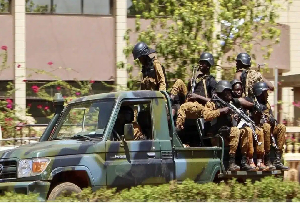 More than 100 people, mostly soldiers, were reportedly killed in a coordinated jihadist assault
More than 100 people, mostly soldiers, were reportedly killed in a coordinated jihadist assault
More than 100 people, mostly soldiers, were reportedly killed in a coordinated jihadist assault in northern Burkina Faso, according to accounts from insiders familiar with the situation.
The deadly operation targeted multiple sites, including a military installation and the long-besieged town of Djibo, early on Sunday.
“JNIM fighters attacked eight localities simultaneously to disperse the Burkina Faso air force. The main attack occurred in Djibo, where JNIM fighters first took control of all the town’s entry checkpoints before attacking the military camps, particularly the Special Anti-Terrorist Unit’s camp,” said an aid worker involved in community outreach, speaking under anonymity due to security concerns.
A local student, who also asked not to be named, said her father was among the dead. Both individuals spoke to The Associated Press.
The group behind the violence, Jama’at Nasr al-Islam wal-Muslimin (JNIM), which pledges allegiance to al-Qaida, later claimed responsibility. The insurgent alliance operates widely across the Sahel region, where Burkina Faso has become a flashpoint for extremist activity.
Charlie Werb, an independent Sahel analyst, examined video evidence from the scene and noted a troubling absence of military air support during the siege—unlike past attacks on Djibo where defense forces pushed back. He said the militants remained in the area for hours unchallenged.
Wassim Nasr, a senior fellow at the Soufan Center, called the assault a bold demonstration of JNIM’s increasing strength. “The fact that Djibo was targeted confirms the extent of JNIM’s freedom of movement within Burkina Faso.”
Once considered a government stronghold, Djibo now symbolizes the deteriorating security under the junta that seized power after two coups in 2022. With half the country effectively outside state control and both armed groups and state forces accused of abuses, the situation has grown increasingly volatile.
Observers warn the junta’s reliance on hastily assembled civilian militias has deepened ethnic divisions and further destabilized the region.
